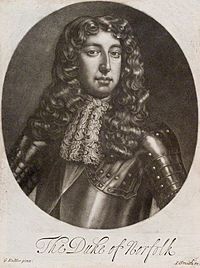Henry Howard, 7th Duke of Norfolk facts for kids
Quick facts for kids
Duke of Norfolk
|
|
|---|---|
 |
|
| Earl Marshal | |
| In office 13 January 1684 – 2 April 1701 |
|
| Monarch | Charles II James II William III |
| Preceded by | The 6th Duke of Norfolk |
| Succeeded by | The 8th Duke of Norfolk |
| Member of the House of Lords Lord Temporal |
|
| In office 13 January 1684 – 2 April 1701 Hereditary Peerage |
|
| Preceded by | The 6th Duke of Norfolk |
| Succeeded by | The 8th Duke of Norfolk |
| Personal details | |
| Born | 11 January 1655 |
| Died | 2 April 1701 (aged 46) Norfolk House, London, England |
| Spouse | Mary Mordaunt |
| Parents |
|
Henry Howard, 7th Duke of Norfolk (born 11 January 1655, died 2 April 1701) was an important English nobleman, politician, and soldier. He was the son of Henry Howard, 6th Duke of Norfolk, and Lady Anne Somerset.
Henry Howard became a member of the House of Lords in 1678. This was a special honor, as he was called to the House of Lords in his own right as Baron Mowbray. His marriage was difficult and later ended in divorce.
Contents
Marriage and Family Life
Henry Howard married Mary Mordaunt. She was the only surviving daughter of the 2nd Earl of Peterborough. They separated in 1685.
Henry Howard did not have any children. After his death, his nephew, Thomas Howard, 8th Duke of Norfolk, became the next Duke. His former wife, Mary, later married Sir John Germain, 1st Baronet. She passed away in 1705.
Life as a Public Figure
The Howard family of Norfolk were mostly Roman Catholic. However, during a time of strong anti-Catholic feelings in England, Henry publicly joined the Church of England. He likely did this to protect his family's lands and wealth.
This plan seemed to work. Even though his father was accused of not attending Anglican church services in 1680, the accusation was quickly dropped.
The Popish Plot and Justice
During this time, there was a false story called the Popish Plot. It claimed that Catholics were planning to kill King Charles II. Many innocent Catholics were accused.
Henry's cousin, William Howard, 1st Viscount Stafford, was executed because of this plot in December 1680. Henry, as a member of the House of Lords, was one of the peers who judged him.
Despite the strong anti-Catholic mood, Henry bravely voted "Not Guilty" for his cousin. This was very unusual, as he was the only one of Stafford's relatives in the House of Lords to do so.
Royal Society and Military Role
Henry Howard became a Fellow of the Royal Society in 1672. The Royal Society is a famous group that promotes science. His father was also a member and supported the Society financially.
In 1685, Henry was made a Colonel of the Suffolk Regiment, a military group. He also received a high honor, becoming a Knight of the Garter in the same year.
As a powerful Duke, he used his influence to help the King. In the 1685 General Election, he made sure that people loyal to the Crown were elected.
Relationship with King James II
By 1688, Henry Howard had disagreements with King James II. He did not agree with the King's strong support for Catholicism.
When asked if his people wanted to get rid of the Test Act, a law that limited Catholics, he famously said that only a few people would agree. He also refused to replace local officials in his area with people more loyal to the King.
He then wisely went to France for a short time. He returned to England just in time to support the Glorious Revolution. This event saw King James II replaced by William and Mary.
Service Under William and Mary
Henry Howard became a Privy Councillor under King William III and Queen Mary II in 1689.
At first, he did not want to take the oath needed to be in the House of Lords. This was because, even though he had publicly joined the Church of England, he was still a Roman Catholic at heart. However, after a few months, he took the oath.
He continued to serve as Lord Lieutenant for several areas, including Berkshire, Norfolk, and Surrey. He was also a colonel in the Berkshire Militia.
The first HMS Norfolk warship was named in his honor. His personal doctor was Thomas Greenhill.
Death
Henry Howard, the 7th Duke of Norfolk, died suddenly in London on 2 April 1701. His secretary, Francis Negus, wrote an account of his death.
Negus wrote that the Duke died suddenly around eleven o'clock. He also mentioned that a medical examination found all his organs were healthy, but there was a lot of clotted blood.
See also
|
 | Jewel Prestage |
 | Ella Baker |
 | Fannie Lou Hamer |

